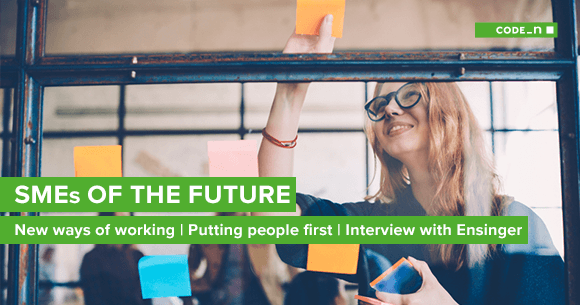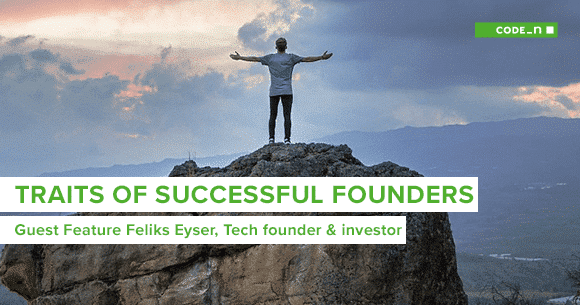JENS-UWE SAUER: “I recommend that all startups take part in pitches or contests.”JENS-UWE SAUER: „Grundsätzlich würde ich jedem Startup empfehlen, sich an einem Pitch oder Contest zu beteiligen.“
Jens-Uwe Sauer in a digital interview with Oliver Gassner about crowdfunding for startups, Seedmatch and what startups need to do to increase their reach.
 Oliver Gassner: Hello Jens-Uwe, would you please introduce yourself to our readers?
Oliver Gassner: Hello Jens-Uwe, would you please introduce yourself to our readers?
Jens-Uwe Sauer: I’m Jens-Uwe Sauer, founder and CEO of Seedmatch.
OG: And what does Seedmatch do?
JUS: Seedmatch is an online platform that provides crowdfunding, giving people the opportunity to invest small amounts in startups. If many do so, a significant amount comes together and the startup can implement its concept.
OG: I noticed that Seedmatch recently funded its first startup. What was it, and what is the financing structure like? A couple of large investors or many small ones?
JUS: Cosmopol was the first startup to be financed by crowdfunding through Seedmatch. Cosmopol is an online shop for special lifestyle products from around the world. We have since then also financed our second startup: Neuronation , a platform that lets you train your memory with entertaining exercises. And now our current startup has also reached the funding threshold and has thus been financed successfully. It’s BluePatent, a patent search platform that taps the expertise of the crowd. Very future-oriented. It’s still possible to invest in BluePatent.
About the financing structure: With Seedmatch, we consciously opened ourselves to a group that has not yet had the opportunity to take part in targeted investment in startups. You either needed the deep pockets of a business angel, or you could invest in a venture capital fund – a black box, as some call it. Seedmatch lets you invest a minimum of 250 euros in a startup. BluePatent currently has 122 investors and has collected 76,000 euros. So that amounts to an average investment share of 620 euros.
OG: Yesterday at the Convention Camp, I heard that “SoLoMo” (Social, Local, Mobile), the Cloud and video are the trends of the future. It sounds as though your startups are currently less of a good fit.
JUS: It’s up to individual investors to choose whether they back such future trends, put their faith in less-hyped topics, or invest in solid business models. Seedmatch lets investors put their own portfolios together. The three startups are a first step. But as I have already said/written, I personally see crowdsourcing as a field with great potential.
OG: In our CODE_n competition, we are looking for innovative ideas for the mobile web and mobile lifestyle. What would you, in the role of judge, look for in a (mobile or web) startup to put on your shortlist? Or to be accepted by Seedmatch, of course.
JUS: At Seedmatch, we are always looking for an investment story. Our aim is to inspire and convince investors of an idea with our online pitch. That encompasses innovations and unique features, as well as a comprehensible and scalable business model. But in the end, a convincing team that can implement the idea quickly and effectively needs to stand behind it.
OG: Are there specific startups that you think have good prospects, where you would recommend they apply to CODE_n?
JUS: Basically, I recommend that all startups – provided they fit the focus of the topic – take part in pitches or contests and present their business plans, and above all discuss them.
OG: What do users want, anyway? What do I need to attract them, in order to increase the reach of my mobile startup?
JUS: You can attract customers with a clear and easily communicated customer benefit. The application either needs to make the users’ lives more pleasant, or it has to help them save money.
OG: Startups can win a presence at CeBIT in a special CODE_n area. What can that mean for the startup? What would you offer as a prize?
JUS: Extensive coverage in partner media or other major media outlets is very important for any startup. Ongoing reporting covering the development of the startup, in which readers can follow its growth, is ideal. Or the startups could win a Twitter campaign that focuses attention on them…
OG: What do CODE_n startups need to ensure long-term success?
JUS: Lasting success calls for an excellent founder team, top developers, people who understand marketing, ideally a media partner that provides coverage, a business angel to act as a sparring partner for the founder team, and Seedmatch to ensure adequate capitalization and to involve the crowd as a disseminator.
OG: What would you advise CODE_n startups: a two-year sprint and selling to a major player as soon as possible, or sticking with it and building long-term business?
JUS: A quick exit is always a nice reward for building a company. But as a founder, you should not have an exit fixation, because only a profitable business is a good business. Still, keeping an eye out for interested buyers early on and presenting yourself as an acquisition candidate with above-average growth can’t hurt, of course.Jens-Uwe Sauer unterhält sich im digitalen Interview mit Oliver Gassner über Crowdfunding für Startups, Seedmatch und erklärt, was ein Startup tun muss, um Reichweite zu bekommen.
 Oliver Gassner: Hallo Jens-Uwe, würdest du dich und Seedmatch bitte kurz vorstellen?
Oliver Gassner: Hallo Jens-Uwe, würdest du dich und Seedmatch bitte kurz vorstellen?
Jens-Uwe Sauer: Jens-Uwe Sauer, Gründer und Geschäftsführer von Seedmatch.
OG: Und was macht Seedmatch?
JUS: Seedmatch ist eine Online-Plattform, die Crowdfunding für Startups anbietet. Über die Plattform kann man sich mit kleinen Beträgen an Startups beteiligen. Wenn das viele Menschen tun, kommt ein größerer Betrag zustande und das Startup kann sein Konzept umsetzen.
OG: Ich habe mitbekommen, dass Seedmatch kürzlich sein erstes Startup finanziert hat. Was war das für eins und wie sieht die Finanzierungsstruktur aus? Ein paar große Geldgeber oder viele kleine?
JUS: Das erste Startup, welches über Seedmatch durch Crowdfunding finanziert wurde, war Cosmopol. Cosmopol ist ein Onlineshop für besondere Lifestyle-Produkte aus aller Welt. Mittlerweile ist auch unser zweites Startup finanziert: Neuronation, eine Plattform auf der man mit unterhaltsamen Übungen sein Gedächtnis trainieren kann. Und mittlerweile hat auch unser aktuelles Startup die Fundingschwelle erreicht und ist damit erfolgreich finanziert. Das ist BluePatent, eine Patentrecherche-Plattform die zur Recherche das Know-how der Crowd einsetzt. Sehr zukunftsweisend. Aktuell kann man sich noch an BluePatent beteiligen.
Und zur Finanzierungsstruktur: Mit Seedmatch öffnen wir uns ganz bewusst einer Zielgruppe, die bislang nicht die Möglichkeit hatte, einzelne Startups gezielt zu fördern. Entweder brauchte man ein Business-Angel-Portemonnaie oder man konnte nur in einen Venture-Capital-Fonds – manche nennen es auch Blackbox – einzahlen. Bei Seedmatch kann man sich bereits mit 250 Euro an einem Startup beteiligen. BluePatent hat aktuell 122 Investoren gewonnen und 76.000 Euro eingesammelt. Das macht also eine durchschnittliche Investmentgröße von 620 Euro.
OG: Ich habe gestern beim Convention Camp gelernt, dass “SoLoMo” (Social, Local, Mobile) plus Cloud und Video die Zukunftstrends seien. Das klingt jetzt so, als ob eure da aktuell weniger ‘passen’?
JUS: Ob man auf diesen Zukunftstrend setzt, an weniger gehypte Themen glaubt oder in bodenständige Geschäftsmodelle investiert, das bleibt jedem Investor selbst überlassen. Denn bei Seedmatch stellt sich jeder Investor sein Portfolio selbst zusammen. Die drei Startups sind mal ein Anfang. Aber wie schon gesagt/geschrieben, ich persönlich sehe in Crowdsourcing-Themen ein großes Potenzial.
OG: Im CODE_n Wettbewerb suchen wir innovative Ideen rund um das mobile Web und den mobilen Lifestyle. Wonach würdest du in einem (Mobile- oder Web-)Startup suchen, das du in der Rolle als Juror auf eine Liste der “engeren Wahl” setzen würdest? Oder natürlich bei einem, das bei Seedmatch aufgenommen wird.
JUS: Bei Seedmatch suchen wir immer nach einer Investmentstory. Schließlich wollen wir die Investoren im Online-Pitch von einer Idee begeistern und überzeugen. Dazu zählen Innovationen und Alleinstellungsmerkmale sowie ein nachvollziehbares und skalierbares Geschäftsmodell. Am Ende muss aber ein überzeugendes Team hinter der Idee stehen, welches das Konzept gut und schnell umsetzt.
OG: Gibt es konkret Startups, denen du gute Chancen zuschreibst und empfehlen würdest, sich bei CODE_n zu bewerben?
JUS: Grundsätzlich würde ich jedem Startup – sofern es thematisch in den Fokus passt – empfehlen, sich an einem Pitch oder Contest zu beteiligen und sein Geschäftskonzept zu präsentieren und vor allem auch zu diskutieren.
OG: Was will eigentlich der User? Womit muss ich den locken, damit ich mit einem mobilen Startup Reichweite bekomme?
JUS: Mit einem deutlichen und klar kommunizierbaren Kundennutzen kann man Kunden gewinnen. Die Anwendung muss das Leben des Users angenehmer machen oder es muss ihm helfen, seine Kosten zu sparen.
OG: Die Startups können eine Präsenz bei der CeBIT in einer speziellen CODE_n Area gewinnen. Was kann das für das Startup bedeuten? Was würdest du als Preis ausloben?
JUS: Ausführliche Medienberichterstattung in den Partnermedien oder weiteren Leitmedien ist für jedes Startup von großer Bedeutung. Ideal ist eine begleitende Berichterstattung über die Entwicklung eines Startups, wo die Leser die Entwicklung mit verfolgen dürfen. Oder die Startups gewinnen z. B. eine Twitterkampagne, die ihnen Aufmerksamkeit schenkt …
OG: Was brauchen die CODE_n-Startups, damit sie langfristig Erfolg haben?
JUS: Für den langfristigen Erfolg braucht ein Startup ein exzellentes Gründerteam, Top-Entwickler, Leute die was vom Marketing verstehen, idealerweise einen Medienpartner, der für Reichweite sorgt, einen Business Angel, der dem Gründerteam als Sparringpartner dient, und Seedmatch, um ausreichend Kapital zu haben und die Crowd als Multiplikator zu involvieren.
OG: Was würdest du den CODE_n Startups raten: 2 Jahre Sprint und möglichst bald an einen “big player” verkaufen oder dranbleiben und langfristiges Business generieren?
JUS: Ein schneller Exit ist immer ein schöner Lohn für den Aufbau eines Unternehmens. Aber man sollte als Gründer nicht Exit-fixiert sein, denn nur ein profitables Business ist ein gutes Business. Sich aber frühzeitig nach interessierten Übernehmern umzusehen und sich mit einem überdurchschnittlichen Wachstum als Übernahmekandidat zu empfehlen, kann natürlich nicht schaden.






Write a comment